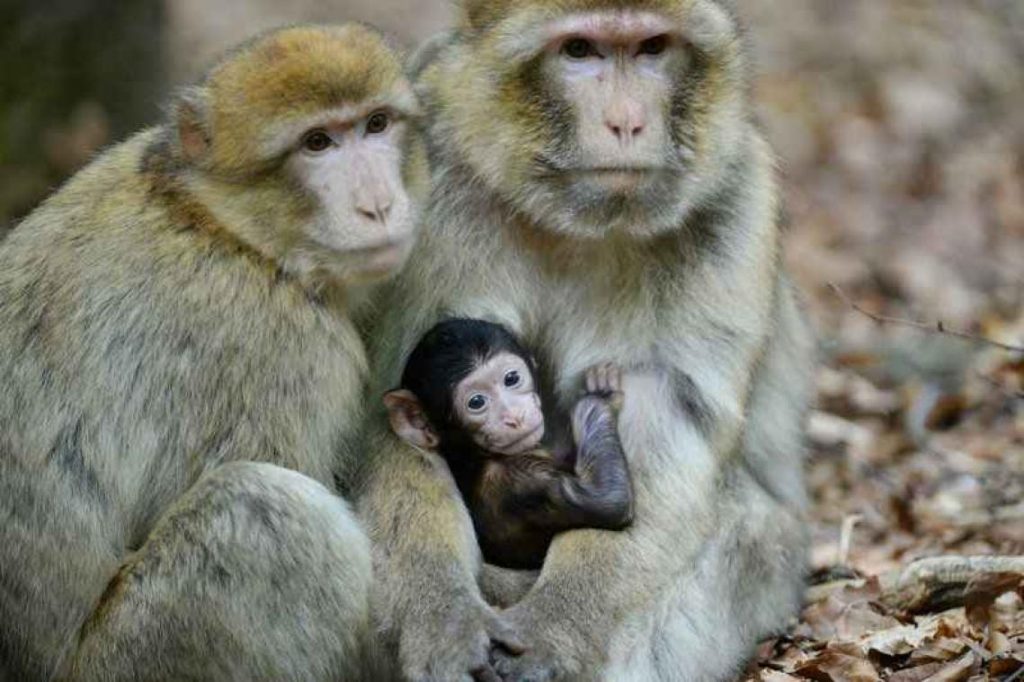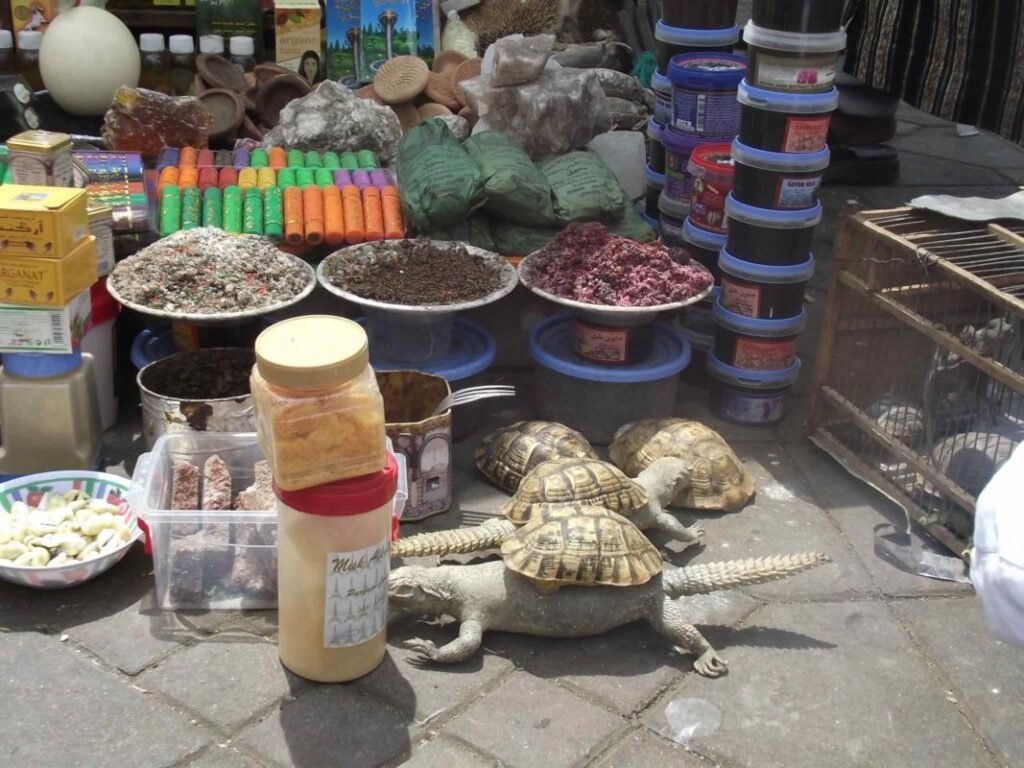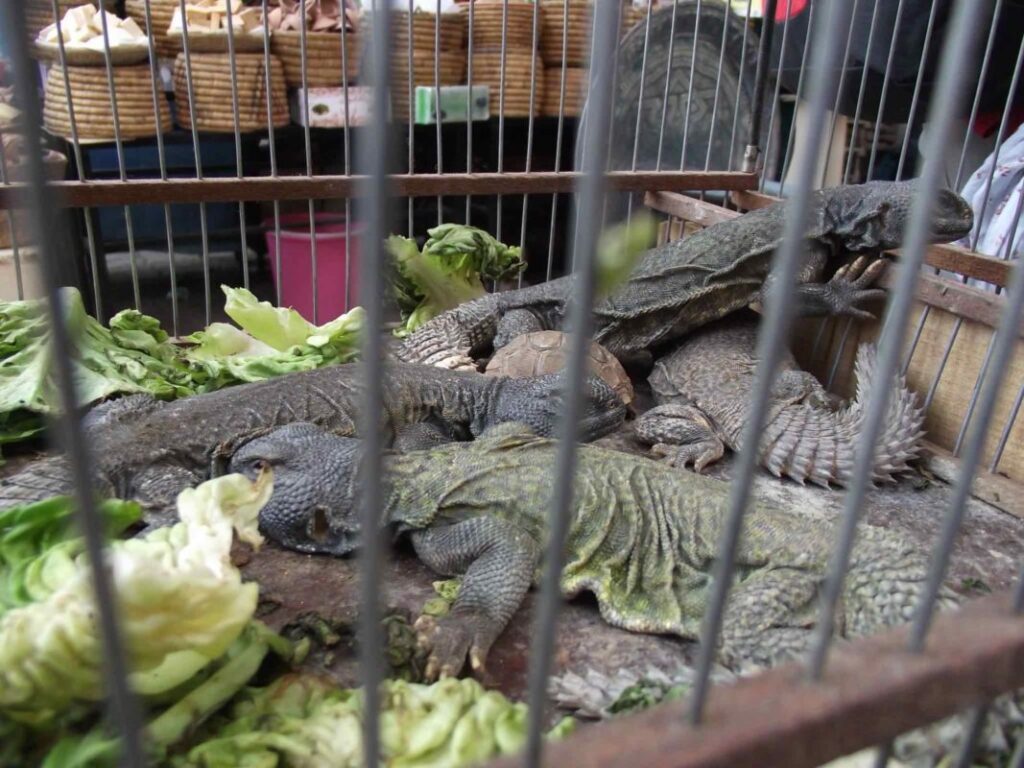The Humane Society of Morocco understands the dire need for local and international conservation efforts to be employed by accredited organizations, in order to mitigate habitat destruction and species extinction.
Endangered wildlife species in Morocco include the Barbary Leopard, Waldrapp, Mediterranean Monk Seal, Barbary Hyena, Cuviers Gazelle and the Spanish Imperial Eagle.

Wildlife issues and trafficking in Morocco pose significant challenges to biodiversity conservation and animal welfare. Despite efforts to protect native wildlife species, illegal wildlife trade remains a pressing concern, driven by demand for exotic pets, traditional medicine, and luxury goods.
One of the primary wildlife issues in Morocco is the poaching of endangered species. Poaching activities, fueled by international demand for wildlife products, threaten the survival of these iconic species and disrupt fragile ecosystems.
Additionally, the trafficking of birds, reptiles, and other exotic animals for the pet trade is prevalent in Morocco. Many of these animals are captured from the wild and smuggled across borders, leading to population declines and ecological imbalances. Furthermore, the illegal wildlife trade often involves cruelty and exploitation, with animals subjected to stress, injury, and inhumane treatment during capture, transport, and sale.
To combat wildlife trafficking in Morocco, concerted efforts are needed to strengthen law enforcement, enhance public awareness, and promote sustainable alternatives to the use of wildlife products. Collaboration between government agencies, non-governmental organizations, and local communities is essential to address the root causes of wildlife trafficking and protect biodiversity for future generations.
The Humane Society of Morocco strives to raise awareness about wildlife issues and trafficking in Morocco, providing information on conservation initiatives, reporting mechanisms for wildlife crimes, and ways for individuals to get involved in wildlife protection efforts.
Together, we can work towards a future where wildlife thrives in their natural habitats, free from the threat of exploitation and trafficking.

In many of the thousands of shops that line the streets of Morocco’s medinas, buyers can find shops called “herbalists” who specialize in herbs, spices, oils, and traditional medicines.
Reptiles and their parts are often found in these shops, a practice persisting from Morocco’s historic past. Accounts of the traditional medicines of Morocco date back as far as 1810 – James Grey Jackson described, in colorful language, the practice of burning chameleons:
“Various medicinal qualities are assigned to the flesh of the chameleon, and many whimsical effects are attributed to fumigation with it when dried. Debilitated persons have recourses to it, and it is accordingly sold in all the drug shops in Morocco. The smell arising from the fumigation is by no means grateful, but what scent will prevent an African from using that remedy which credulity or superstition has persuaded him will give strength to the impotent!”
Despite this, and other more recent accounts, no previous studies have quantified the number of animals used in Morocco for medicinal purposes. To investigate the trade of reptiles for medicinal practices, a study carried out 49 surveys of 20 towns and cities in Morocco. It was noted the presence of any wild species found in markets and, where possible, gathered information on their uses, turnover, and origins.

More than 1,500 specimens of at least 9 reptile species in 14 cities and towns were counted. Marrakech and Casablanca contained the most specimens with an average of 163 and 86 per survey in each city, respectively. The specimens observed, together represent in the region of USD 100,000 worth of goods. The most commonly observed animals were Mediterranean chameleons and Bell’s dabb lizards, sold both live and taxidermal. Traditional applications of wildlife in Morocco combine cultural, mystic, and medical uses. The uses of animals were reported as varied, but reflect the traditional uses of the past. Chameleons were mostly sold dried and perceived to protect from a range of ailments, from headaches to the evil eye (a look from a person that is supposed to invoke a curse or bad luck). Stuffed bell’s dabb lizards are placed under the corner of a new house to bring luck or can be burned to help with eye irritation.
Morocco has recently brought in national legislation to protect wildlife from overexploitation, with fines of up to USD 10,000 for trade of any species within the highest category of protection (e.g. species included on CITES Appendix I) according to Law n°29-05 on the Protection of Species of Flora and Fauna and the Control of their Trade. Despite these new laws, the trade has not diminished over time, nor has the openness of the trade. Reptiles are still sold openly and throughout the country.
With this information, we intend to lobby the government to better enforce national wildlife trade laws in hopes that Moroccan authorities will use these new laws to curb the unregulated trade of reptiles in markets.

As such, the HSM acknowledges that accredited non-profit zoological facilities and aquariums do have a role to play in conservation and public education initiatives.
The HSM applauds facilities that hold a primary focus on the following mandates:
The Humane Society of Morocco strongly encourages existing accredited zoological facilities to shift their focus away from displaying live animal species as a means of public education. Rather, the HSM encourages such facilities to focus on launching local and global animal conservation initiatives, while simultaneously acting as refuges and sanctuaries for un-releasable wildlife and confiscated exotic pets.
Specifically, the HSM encourages accredited zoological facilities to transition by:
The Humane Society of Morocco strongly opposes facilities that display wild animals and the primary business is to profit from public interaction and viewing of the displayed animals. These types of activities have no place in a humane and respectful community.
| Cookie | Duration | Description |
|---|---|---|
| cookielawinfo-checkbox-analytics | 11 months | This cookie is set by GDPR Cookie Consent plugin. The cookie is used to store the user consent for the cookies in the category "Analytics". |
| cookielawinfo-checkbox-functional | 11 months | The cookie is set by GDPR cookie consent to record the user consent for the cookies in the category "Functional". |
| cookielawinfo-checkbox-necessary | 11 months | This cookie is set by GDPR Cookie Consent plugin. The cookies is used to store the user consent for the cookies in the category "Necessary". |
| cookielawinfo-checkbox-others | 11 months | This cookie is set by GDPR Cookie Consent plugin. The cookie is used to store the user consent for the cookies in the category "Other. |
| cookielawinfo-checkbox-performance | 11 months | This cookie is set by GDPR Cookie Consent plugin. The cookie is used to store the user consent for the cookies in the category "Performance". |
| viewed_cookie_policy | 11 months | The cookie is set by the GDPR Cookie Consent plugin and is used to store whether or not user has consented to the use of cookies. It does not store any personal data. |
Create an account or sign in to save pets you love.
Don't have an account? Contact us
Before you proceed with your adoption application, please review and accept our data handling practices:
Note: By clicking "I Agree & Continue", you will be redirected to an external application form. This tracking system logs your interest but does not capture data from the external form.
Create an account or sign in to save pets you love.
Don't have an account? Contact us
Before you proceed with your adoption application, please review and accept our data handling practices:
Note: By clicking "I Agree & Continue", you will be redirected to an external application form. This tracking system logs your interest but does not capture data from the external form.